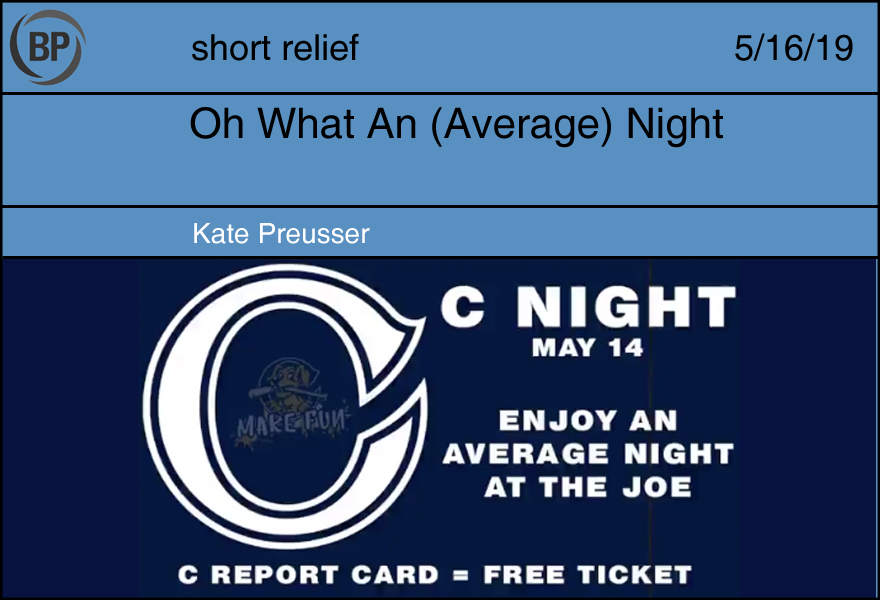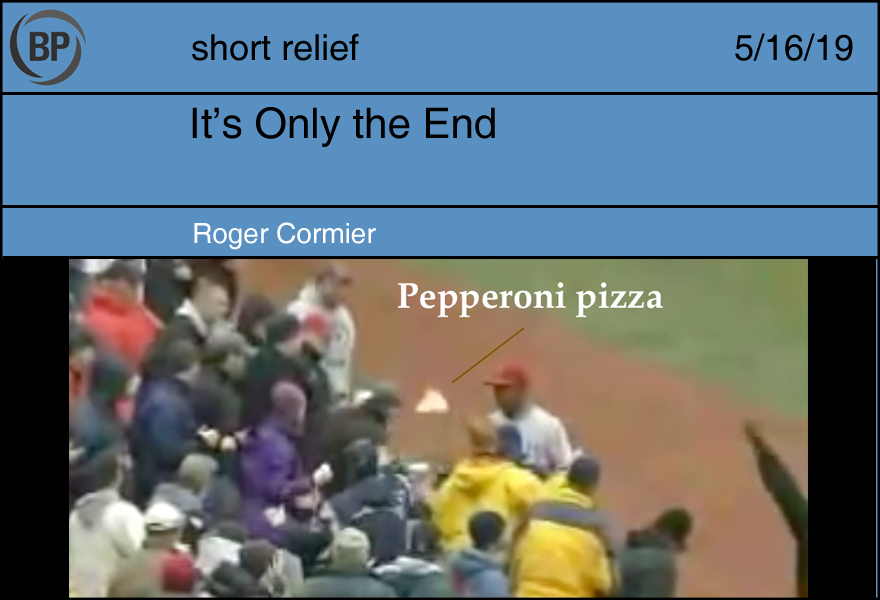
This past Tuesday, the Charleston RiverDogs, A-ball affiliate of the New York Yankees, hosted “Average Night,” a celebration of baseball averages, but also, averageness in the greater sense. “Are you one of your parents’ favorite children? A solid five?” asked the video promos, inviting you to come on out–on a Tuesday, the most average of nights–to the ballpark. Anyone who brought a report card with a C got free admission, because C’s get degrees, and seats, apparently.
The inspiration for the night was the RiverDogs’ alternate jerseys, bearing a large yellow “C” across the front. From there, the idea blossomed: specials on concession items that began with “C” (cookies, chips, cola); Sesame Street-style celebrations of the letter C; a visit from a C-level celebrity. (When asked by a local reporter about what celeb might get tapped for the honor, RiverDogs Director of Promotions Nate Kurant replied: “That’s kind of a wait-and-see thing. Honestly, we’ve given that about a C-level effort.”) “Come celebrate the meaty part of the bell curve on a night that promises to be perfectly mediocre,” the official website entreated.
This is tongue-in-cheek, of course: first as the promos indicate, Charleston is an above-average city, with its graceful palms, beaches, and cobblestone streets. Second, the game was a slugfest, with the RiverDogs and West Virginia Power trading blows and holding a 5-5 tie up until the ninth, when Charleston walked it off. It’s some Murphy’s Law-adjacent thing that if a game is promised to be perfectly mediocre, it won’t be.
But even if the game had been a 2-1 snoozefest, it still wouldn’t have been average. Prospects who have made it to the South Atlantic League are on the extreme edge of everyone who plays baseball: the former Little Leaguers who choose a new sport in high school; the former high school players who play intramural baseball in college, if they play at all; the college players who go undrafted and put away their spikes along with their mortarboard and tassels. What your third grade math teacher probably didn’t tell you is average is relative; an average Triple-A hitter is a monster in the Sally League, while any one player off the RiverDogs roster would immediately be the best player on the local college’s team. The players, like the city, are above-average; the joke of “average night” only works if that’s the case, if everyone involved is safely ensconced on the upper edge of the bell curve, looking down.
And at whom are they looking? You, me, those of us who would be in attendance that night at the park, the average fan, perhaps clutching a report card bearing a C, a badge of averageness. The soft, meaty part of the bell curve. American exceptionalism teaches its citizens from an early age to shoot for the stars, to do great things befitting of the greatest country in the world. But sometimes, you just want to curl up in the belly of the curve with a cookie and a Coca-Cola and take in a baseball game.

Hunter Pence’s favorite television show is coming to an end, and there are some angry people out there. Expectations have developed over the years. Promises were implied. Characters grew up, then took both steps back to where they started. All a depiction of verisimilitude to how human beings tend to work most of the time? Or to make a plot work? Ends remain too loose for comfort with too little time to spare.
This all reminds me of the denouement of Lost, and how frustrated people were when it ended in 2010. The lesson I took from it was that science fiction/fantasy shows activate the imagination, and the imagination triggers a plethora of crazy theories, and by the time the conclusion is written and shot and presented to the audience as the one true ending, it can’t possibly live up. Especially if it involves Smoke Monsters.
Two of my favorite moments from Lost involved Jack and the Boston Red Sox. The show debuted in September 2004, and there was a whole thing about Jack’s father always saying “That’s why the Red Sox will never win the Series” to explain away anything unpleasant as an act of fate. Sawyer heard Jack use the expression, realized he met Jack’s father before he died, and eventually Sawyer revealed to Jack that his father, in fact, loved his son. This also led to Jack’s mind getting blown in an early season three episode, aired in 2006, when he saw for himself through his disbelieving eyes that the Red Sox actually won the World Series.
Lost wasn’t just its ending. I read about science, on purpose, online during the first decade of the 21st century because of the show. I could not have been alone – people could have only been worked up over the ending because they really liked what they saw leading up to the finale, right? I don’t regret watching the aforementioned scenes because of how one episode out of 121 fared. Game of Thrones too will not just be its ending – it will be one episode out of 73 installments (1.4 percent) of the entire catalogue. This season alone featured [redacted] getting knighted, and [redacted] [redacted]ing the [redacted] King, two moments I won’t forget about for a long time.
College is ending for some of you. You had some fun, and I doubt you’ll forget those fun memories because an author you never heard of bored you to tears at your graduation ceremony. Did Red Sox fans who passed away between 1919 and 2003 regret watching Ted Williams and Carl Yastrzemski play? Had they not won in 2004 or ever again, would fans have regretted being witnesses to “Here comes the pizza”?
Look: I don’t know how to tell you this, but there’s a decent chance the baseball team you root for might never win it all in your lifetime. I suggest enjoying the journey that is the regular season, when, get this: something irregular happens all the damn time. Whether or not your team shows up one season with the Horn of Eld and the expectations are thus higher than usual and everyone swears things will be different and they still disappoint in the end, do not despair: it was only the end.
Thank you for reading
This is a free article. If you enjoyed it, consider subscribing to Baseball Prospectus. Subscriptions support ongoing public baseball research and analysis in an increasingly proprietary environment.
Subscribe now